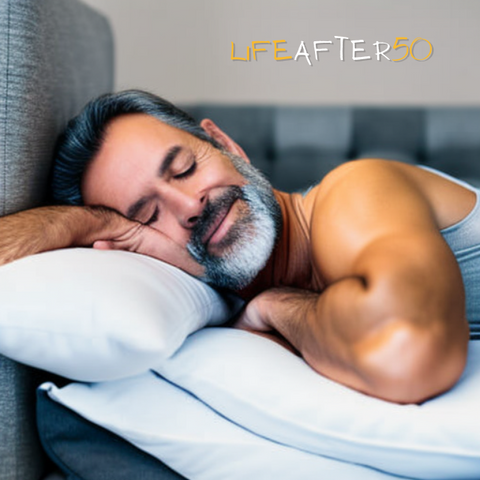This could be the most important component of the entire ‘Healthy Lifestyle’ puzzle. Sleep doesn’t come as easy and often as it did when we were younger. The older we get, and the more stress life brings, the tougher it is to get the hours of quality sleep you want and need. The irony is, you need it more when you’re older, especially for men after fifty years of age.
Long story short, I had some family problems a few years back and it was very stressful on me, and my sleep and sleep quality was demolished. I would usually wake up around 3 am, with my heart beating, my mind racing, and mega anxiety. Adrenalin rushing and cortisol levels increasing. It would take a few hours to fall back asleep if I did at all. Of course, that ruined the next day, and then ‘Groundhog day’ continued the loop cycle. I tried sleeping pills at first, but I knew that was a temporary solution. I knew I had to research and find a healthy long-term solution. Well, I did, and it includes a quality diet, exercise, reducing stress and alcohol, getting proper vitamins and supplements, etc. It’s really important to get your Circadian rhythm. Go to sleep around the same time every night, and wake up around the same time every morning.
Sleep is very important concerning testosterone levels and your overall health, especially for men over fifty. Most of your daily testosterone production and its release into your body happens during sleep.
Fatigue can negatively impact testosterone levels in men by causing the release of cortisol, a stress hormone that can inhibit the production of testosterone. Chronic stress and lack of sleep, which are often associated with fatigue, have also been linked to decreased testosterone levels. Additionally, physical exhaustion can lead to decreased testosterone production as well, since the body may prioritize recovery over hormone production during times of stress. These changes in hormone levels can impact several aspects of men’s health, including their energy levels, mood, and sexual function.
If your hormone levels typically hover just above the line that separates normal and low, such irregularity could pull you into symptomatic territory. If that’s you, lifestyle interventions such as more exercise, improved diet, and better sleep may provide avenues for improving your condition.
DO YOUR RESEARCH!
Quality sleep is important for health for several reasons:
First, it allows the body to repair and rejuvenate itself, both physically and mentally. During sleep, the body undergoes several physiological changes that help to repair and rejuvenate itself. Some of the key processes that occur during sleep include:
- Cellular repair: Sleep allows the body to repair and regenerate damaged cells, tissues, and muscles. This is particularly important for athletes or people who engage in regular physical activity, as they may experience more wear and tear on their bodies.
- Hormonal regulation: During sleep, the body produces and releases hormones that help to regulate various bodily processes. For example, the body releases growth hormones during deep sleep, which helps to repair and build muscle tissue.
- Immune system boost: Sleep also helps to boost the immune system, making it more effective at fighting off infections and illnesses. During sleep, the body produces more white blood cells, which help to fight off bacteria and viruses.
- Memory consolidation: Sleep plays an important role in consolidating and organizing memories. During sleep, the brain processes and organizes new information, making it more easily accessible for later use.
- Stress reduction: Sleep also helps to reduce stress and promote relaxation. During sleep, the body releases the hormone melatonin, which helps to regulate the sleep-wake cycle and promote feelings of calm and relaxation.
Second, it helps to regulate hormones such as testosterone, which are essential for maintaining energy levels, muscle mass, and overall health in older men. During sleep, the body undergoes several physiological changes that help to repair and rejuvenate itself. Some of the key processes that occur during sleep include:
Sleep plays a critical role in regulating hormones such as testosterone. Testosterone is a steroid hormone that is responsible for the development of male secondary sexual characteristics and is important for maintaining muscle mass, bone density, and sperm production in older men.
During sleep, the body produces and releases hormones that regulate various bodily processes. The release of testosterone is regulated by the hypothalamus and the pituitary gland, which are both part of the endocrine system. The hypothalamus releases gonadotropin-releasing hormone (GnRH) which stimulates the pituitary gland to release luteinizing hormone (LH), which in turn stimulates the testes to produce testosterone.
Studies have shown that men who have poor sleep quality or suffer from sleep disorders such as insomnia have lower levels of testosterone. This can be due to the disruption of the regular sleep-wake cycle, which can result in the abnormal release of hormones. Additionally, the stress hormone cortisol is known to inhibit the release of testosterone. Stress and poor sleep quality are known to increase cortisol levels, which might lead to a decrease in testosterone levels.
Third, lack of sleep has been linked to many health problems, including obesity, diabetes, and cardiovascular disease. Additionally, Testosterone plays a vital role in maintaining muscle mass, bone density, and sperm production in older men. Poor sleep quality can lead to a decrease in testosterone levels, which can contribute to age-related health issues such as decreased libido and increased risk of osteoporosis.
Overall, sleep is essential for the body’s repair and rejuvenation, and it plays a critical role in maintaining overall health and well-being.
Here are some ways to improve your sleep time and quality:
- Stick to a consistent sleep schedule.
- Create a bedtime routine to relax before sleep.
- Create a sleep-conducive environment (cool, dark, and quiet).
- Limit exposure to screens before bedtime.
- Avoid caffeine and alcohol before sleep.
- Get regular physical activity during the day.
- Avoid heavy meals, especially close to bedtime.
- Find ways to manage stress and clear your mind before sleep.
- Consider using a white noise machine to help you fall asleep.
- If necessary, seek the help of a sleep specialist or a doctor.
As you get older and especially for men over fifty, sleep and sleep quality become even more important for your health and quality of life.




